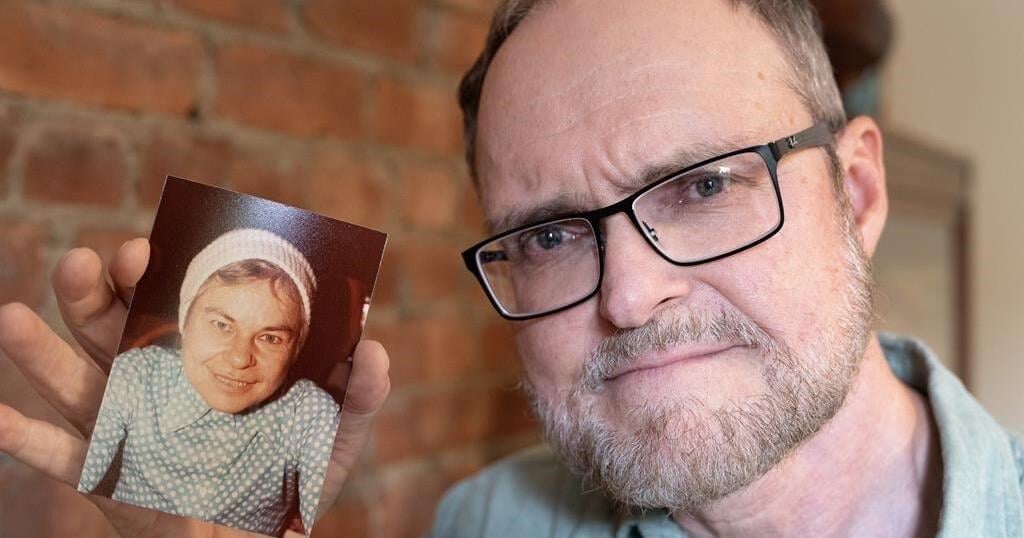MONTREAL – Family members of patients allegedly brainwashed decades ago at a Montreal psychiatric hospital are afraid they’re running out of time to get compensation because the federal government and McGill University have filed motions to dismiss their lawsuit.
Glenn Landry’s mother, Catherine Elizabeth Harter, was among the hundreds of people to receive experimental treatments under the MK-ULTRA program, funded by the Canadian government and the CIA between the 1940s and 1960s at Montreal’s Allan Memorial Institute, which was affiliated with McGill University.
Landry was born after his mother’s 1959 stay in the hospital, and had to be raised by a foster family because she couldn’t care for him.
While he says early traumas she experienced prior to seeking treatment undoubtedly played a role in her mental health issues, he believes the shock treatments and drug therapy she received during her months-long stay under the care of Dr. Donald Ewen Cameron and his colleagues robbed him of a relationship with her.
“She was no longer the person that she would have been, because there was no way that I could ever ask her about any kind of memories,” he said of his mother, who he saw about once a year until her death in the 1980s.
“She spent time with me because I was her son, but there was nothing about herself as a person that I can glean. It was not there.”
Landry is one of about 60 families participating in a lawsuit against the Canadian government, the McGill University Health Centre and the Royal Victoria Hospital over the MK-ULTRA program. The plaintiffs allege their family members were subjected to psychiatric experimentation that included powerful drugs, repeated audio messages, induced comas and shock treatment that reduced them in some cases to a childlike state.
Lawyer Alan Stein, who represents the group, said he had been hopeful the government and hospitals would agree to start talks around compensation for his clients — many of whom are elderly. Instead, the opposing parties filed motions in Quebec Superior Court last week to dismiss, arguing the lawsuit is “unfounded in law and constitutes an abuse of procedure.”
The government and hospitals argue the claims are prescribed — that they should have been filed years or even decades ago when the facts surrounding the case first came to light.
“In addition to being prescribed, the originating application is an abuse of process in that it seeks to re-litigate determinative questions of fact and law that the courts of Quebec adjudicated over two decades ago,” one of the motions read.
In an email, a spokesperson for Canada’s Department of Justice says the government “acknowledges the hurt and pain inflicted on those impacted by these historical treatments,” but believes the claims are unfounded.
The departmentsaid a 1986 report into Cameron’s work found that the Canadian government did not hold legal liability or moral responsibility for the treatments but nevertheless decided to provide victims with assistance in the 1990s for “humanitarian reasons.” The McGill University Health Centre declined to comment.
Stein, in a phone interview, says the motion to dismiss is a delaying tactic from government lawyers. “They feel that my clients will not proceed further, that they’ll lose confidence and just not agree to continue further with the proceedings,” he said.
He says his clients should still have the right to sue because they didn’t know earlier that it was an option available to them. And while some victims were compensated, the money for the most part did not extend to family members, he added.
The lawsuit is asking for close to $1 million per family, for what Stein calls a “total miscarriage of justice.”
Landry, who compares the victims’ ordeal to the internment of Japanese Canadians during the Second World War, says that victims also want an apology.
Because another group of Cameron’s alleged victims, and a different lawyer, had previously filed a class-action request, Stein chose instead to file a direct action, which allows plaintiffs to be mandated by others in similar circumstances to sue on their behalf. Quebec Superior Court set the stage for a trial in 2022 when it rejected an application by the government and the hospitals to partially dismiss the lawsuit, but the process was dragged out by an appeal, which also failed.
The proposed class-action lawsuit representing the other victims had tried to include the United States government as a defendant, but Quebec’s Court of Appeal ruled earlier this year that the U.S. state cannot be sued in Canada for its alleged role in the experiments; the Supreme Court of Canada refused to review the case.
While the two lawsuits are separate, Stein believes a victory by the government and hospitals in his lawsuit would make it very hard for the other effort to move forward since it would likely be targeted with a similar motion.
One of the two named plaintiffs in Stein’s suit has already dropped out. Marilyn Rappaport said in an interview that she withdrew after her husband died. That devastating loss, combined with her ongoing need to support her siblings who were victims of the experiments, made it too hard to contemplate the prospect of reliving her terrible childhood memories in court, she said.
Rappaport says her once beautiful and artistic sister Evelyn has experienced what she describes as a “living death” in the decades since she went to the hospital for treatments including being put to sleep for “months at a time” and subjected to audio messages on repeat. Now in her 80s, her sister is institutionalized and her memory is “totally gone,” Rappaport says.
While she’s no longer part of the lawsuit, Rappaport is still hoping for a victory and upset that the government is still fighting.
“I cannot understand why it’s taking so long,” she said.
This report by The Canadian Press was first published Sept. 17, 2024.

























